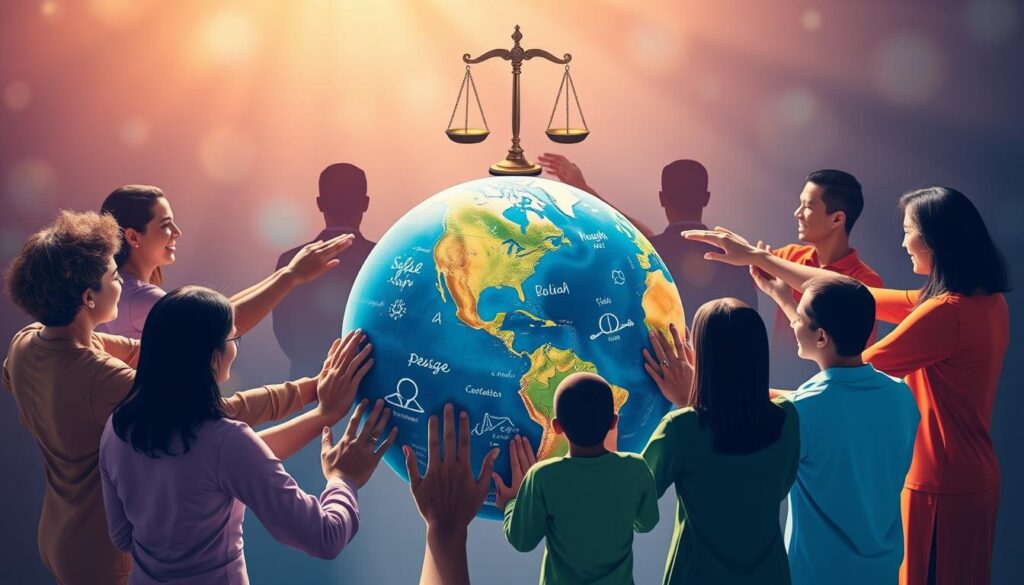International law is key in shaping global relations and promoting cooperation. With over 560 multilateral treaties with the UN Secretary-General, it’s vital. The complexity of global legal norms and cross-border regulations can be overwhelming.
Understanding international law is essential for those in today’s globalized world. They aim to connect clients with trusted legal experts. This makes international law more accessible and understandable.
The importance of international law is huge. It provides a framework for resolving disputes and promoting cooperation. With globalization, clear and consistent global legal norms and cross-border regulations are more important than ever.
They provide a platform for individuals and organizations to access trusted legal experts. This makes international law more accessible and understandable. It helps promote a more just and peaceful world through international law and cross-border regulations.
Introduction to International Law
International law is a complex field that guides global relations. It’s based on an international legal framework with transnational treaties. It’s enforced by international court jurisdiction. This field has a long history, starting with ancient civilizations.
The growth of international law has been influenced by major events and figures. The United Nations and the International Court of Justice are key milestones. Today, it helps foster peace, stability, and cooperation among nations.
Some key aspects of international law include:
- Sovereignty and jurisdiction
- State responsibility
- Human rights and humanitarian law
- International trade and environmental law
International law deals with how nations interact, unlike domestic laws that apply only in one country. The international legal framework is built on over 500 multilateral transnational treaties in force.
The international court jurisdiction interprets and applies international law in state disputes. The International Court of Justice is the main judicial body of the United Nations. Its decisions are legally binding on states.
| Source of International Law | Description |
|---|---|
| Treaties | Written agreements between states |
| Customary International Law | Unwritten rules based on state practice |
| General Principles of Law | Principles recognized by civilized nations |
Key Principles of International Law
International law is built on key principles like sovereignty, jurisdiction, and state responsibility. These guide global relations. They help regulate cross-border trade and agreements, making sure countries respect each other’s rights.
International arbitration is key in solving disputes peacefully. Extradition law also helps by letting countries work together to catch criminals, no matter where they are.
- Sovereign equality of states
- Non-intervention in the internal affairs of other states
- Prohibition of the use of force
- Respect for human rights
These principles are vital for global peace and stability. They are important in many areas, like trade, diplomacy, and solving conflicts.
Types of International Law
International law has two main parts: public and private. Public international law sets rules for countries and international groups. Private international law handles legal issues that cross borders, like online shopping or family law.
In the world of global legal norms, international law is key. It helps manage cross-border regulations. For example, it deals with patent and copyright issues between countries.
Public vs. Private International Law
Public and private international law are different. Public law deals with countries and groups. Private law handles issues between people and companies across borders.
Treaties and Conventions
Treaties and conventions are vital in international law. They help countries work together and solve problems. The Kyoto Protocol is a treaty on climate change, showing how important global legal norms are for solving big issues.

Customary International Law
Customary international law are unwritten rules followed by countries. These norms are important and help shape international law. They influence cross-border regulations and global relations.
Major International Organizations
The United Nations is key in promoting international law and solving disputes. The General Assembly can pass nonbinding resolutions. The Security Council can authorize force to keep peace and security.
Other groups, like the World Trade Organization, oversee cross-border trade and agreements. They encourage cooperation and solve disputes through arbitration.
Some notable international organizations include:
- United Nations (UN)
- Association of Southeast Asian Nations (ASEAN)
- Council of Europe
- World Trade Organization (WTO)
These groups work together to support international law and solve disputes. International arbitration helps nations cooperate and solve issues peacefully and efficiently.
International organizations have grown, leading to more cooperation and law development. As the world connects more, these organizations and laws will become even more important.
| Organization | Purpose |
|---|---|
| United Nations | Promote international law and resolve disputes |
| World Trade Organization | Supervise and regulate cross-border trade and agreements |
The Role of International Law in Human Rights
International law is key in fighting for human rights. The Universal Declaration of Human Rights, made in 1948, has led to over 80 human rights treaties. These treaties have been signed by almost every country in the United Nations. This shows a big commitment to protecting human rights worldwide.
The International Covenant on Civil and Political Rights and the International Covenant on Economic, Social and Cultural Rights started in 1976. Together with the Universal Declaration of Human Rights, they make up the International Bill of Human Rights. This is a big part of international law. It makes sure countries respect and protect human rights, which is vital for dignity and happiness.

- Universal Declaration of Human Rights (1948)
- International Covenant on Civil and Political Rights (1966)
- International Covenant on Economic, Social and Cultural Rights (1966)
- UN Convention Against Torture (1984)
These documents show how important international law is for human rights. They help make sure countries follow global rules. This helps create a fairer and more just world for everyone.
International Trade Law
International trade law is key in managing cross-border trade and agreements. It helps nations work together. The World Trade Organization (WTO) is the main body for settling trade disputes. Its rules guide global trade.
When trade disputes come up, international arbitration helps solve them. This makes sure trade rules are followed fairly.
Trade remedies, like antidumping duties, help protect domestic industries from unfair foreign competition. The International Trade Commission (ITC) sets these duties. They are used when products are sold too cheaply.
Export control laws also play a big role. They help manage the flow of goods and services across borders. These laws are important for following extradition law and other rules.

Trade agreements, like those from the WTO, aim to cut down trade barriers. They promote free trade. These agreements include rules for international arbitration. This helps solve disputes and encourages cooperation among nations.
- Trade remedies, such as antidumping duties, protect domestic industries from unfair foreign competition.
- International arbitration resolves trade disputes, promoting cooperation among nations.
- Export control laws regulate the flow of goods and services across borders, ensuring compliance with extradition law and other regulations.
Environmental Law on an International Scale
Environmental law is key to keeping our planet safe and sustainable. It’s a big part of international law. Experts talk a lot about how it works in times of war.
The idea of “differentiation” is important in this field. It means countries share the costs of protecting the environment based on their wealth. This idea helps countries work together better and share the environmental load fairly. Global legal norms and cross-border regulations help make sure the environment is a top priority worldwide.
Some important things to know about environmental law globally include:
* Protecting the environment during wars
* Using IEL in conflicts
* The role of “differentiation” in fighting climate change
* How international groups help protect the environment
In short, environmental law on a global scale is complex. It needs countries and international groups to work together. By using international law, global legal norms, and cross-border regulations, we can make the world a greener and more sustainable place.
| International Agreement | Year | Purpose |
|---|---|---|
| Paris Agreement | 2015 | Climate change mitigation and adaptation |
| Stockholm Declaration | 1972 | Environmental protection and sustainable development |
Dispute Resolution in International Law
International law helps settle disputes between countries, companies, and people. The international court jurisdiction is key, acting as a place for peaceful dispute resolution. Cross-border trade and agreements often lead to legal complexities, making international arbitration a common solution.
Recently, international arbitration has grown in use for cross-border trade and agreements disputes. It offers a neutral space for disputes, avoiding national biases. The international court jurisdiction also ensures these arbitration decisions are enforced.
Some main ways to solve disputes in international law are:
- Negotiation
- Mediation
- Conciliation
- Arbitration
- Litigation
These methods can be used alone or together to solve disputes peacefully. The right method depends on the dispute’s details and the parties’ wishes.
Contemporary Challenges in International Law
International law is facing many challenges today. These include cybersecurity issues and global migration. These problems need global legal norms and rules that apply across borders. The rise of technology has brought new cybersecurity threats. These threats can affect global relations and how countries work together.
The international law system must grow to meet these challenges. It needs new rules and norms for cross-border activities. This will help countries cooperate better. Some big challenges include:
- Cybersecurity issues, such as cyber-attacks on critical infrastructure
- Global migration, including the protection of migrant rights and the regulation of cross-border movements
- The application of international law in the context of emerging technologies, such as artificial intelligence and autonomous weapons
Overcoming these challenges will take effort from all nations, international groups, and civil society. We need new global legal norms and cross-border regulations. By working together, we can keep international law strong. It helps us achieve peace, security, and human rights worldwide.
The Future of International Law
The world is facing many challenges as it deals with globalization. International law is evolving, with new ways to handle global issues. This includes using human rights law and international criminal law to address problems like pollution and terrorism.
These laws are becoming more important because they touch on issues that start at home. They show that many global problems have roots in domestic affairs. This means international law needs to work better with local governments to be effective.
The balance of power is changing, with Western and non-Western countries playing different roles. This change is leading to different ways of dealing with global problems. For example, the Russia-Ukraine conflict and the Gaza conflict have shown this diversity.
International law is also changing how it operates. The “European way of law” is spreading, influencing legal systems worldwide. This shift is part of a broader reorganization in how international law works.
The future of international law looks promising, with new trends and innovations on the horizon. By embracing these changes and working together, international law can help keep the world peaceful and protect human rights.



